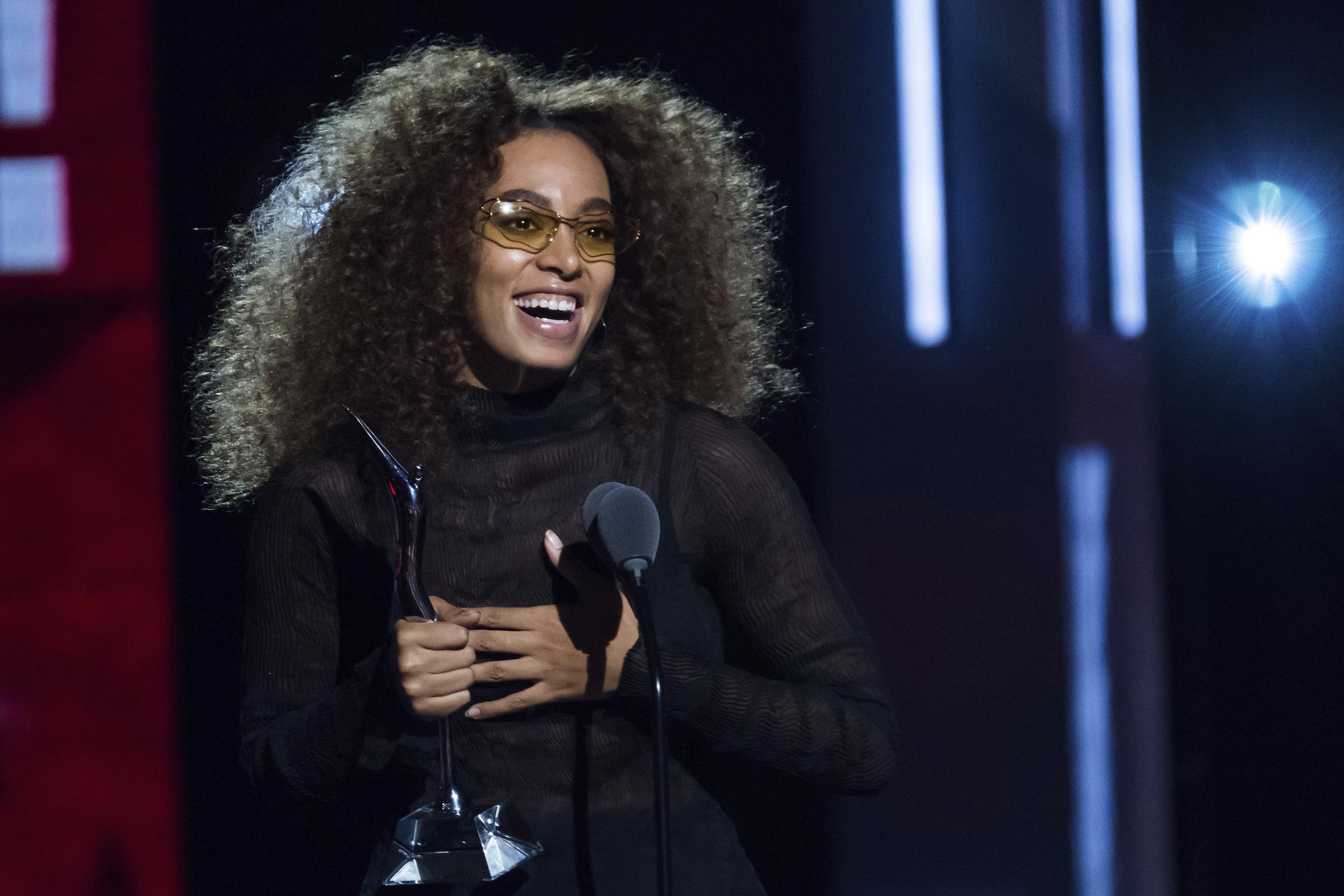4 Things To Know About Afropunk

Solange will perform at the Afropunk festival Oct. 14 and 15 in Atlanta. More than a music festival, Afropunk is a “culture that encourages the acceptance of Black kids around the world who don’t conform to the stereotypical images created of our people.”
CHARLES SYKES / INVISION/AP, FILE
The concept of Afropunk is a lot of things.
It’s an unconventional exploration of self-identity. It’s a culture that encourages the acceptance of Black kids around the world who don’t conform to the stereotypical images created of our people.
For me, Afropunk is a freeing concept because I am Black, I am a girl, I am queer and inherit unique struggles of each of these communities. Afropunk celebrates our differences, helping us to celebrate each other.
This is what Afropunk is, in the spiritual and conceptual sense of it. But it is also obviously a popular music festival with a deep and rich history to it. So, to deeper understand this festival and culture, here are some things that make Afropunk, well, so Afropunk.
- What Is Afropunk?
Afropunk’s creators define the movement as:
- “Afro: as in, born of African spirit and heritage; see also black (not always), see also rhythm and color, see also other, see also underdog.”
- “Punk: as in, rebel, opposing the simple route, imbued with a DIY ethic, looking forward with simplicity, rawness and open curiosity; see also other, see also underdog.”
“Afropunk,” a concept originating from the unacknowledged presence and influence of black people and culture within the predominantly white punk scene and Eurocentric alternative culture, has evolved into distinct, individual culture in and of itself.
In this case “punk” is a philosophy, not a culture, sound, or genre that is defined by any singular narrative. This idea is further reinforced by the fact that aspects of punk aesthetic (body piercings) are indicative of African culture.
The Afropunk concept originated from the 2003 documentary created by Matthew Morgan and James Spooner.
The film would gain momentum at film festivals that year and develop an online platform and community, inciting a cultural movement and evolution of musical expression. The documentary itself revolved around the black presence and influence within the punk and alternative music scenes.
In 2005, Afropunk hosted its first festival at the Brooklyn Academy of Music. Originally, Afropunk catered to a more punk and alternative sound and narrower audience. It has since shifted to include soul and alternative R&B, a fact harped on by longtime Afropunks.
The distinct shift from predominantly punk alternative genres that featured artists like Bad Brains, Cipher, and Ten Grand, grew into including neo-soul, alternative and contemporary r&b, funk and conscious rap acts like SZA, Lion Babe, Lianne La Havas, Mykki Blanco and Danny Brown.
The transition has continued into this year where headliners like Solange are featured.
The festival has since spread from the roots it put down in Brooklyn, New York, in 2005, to move to cities like London, Paris, Johannesburg, and, of course, Atlanta. By widening its reach, Afropunk has grown from a small celebration into a global festival that reaches audiences as big as 60,000 at a time.
ATL! The Carnival of Consciousness is back on Oct 14/15. We’ve added more amazing talent to our lineup!
Tickets at: https://t.co/uR0DAkRRUr pic.twitter.com/LDCKb64LQC— AFROPUNK (@afropunk) August 23, 2017
- No ‘Ism’ Or ‘Obias’ Allowed
Afropunk promotes social awareness and consciousness by supporting LGBTQ and minority communities and movements.
It practices a philosophy of “No Sexism, No Racism, No Ableism, No Ageism, No Homophobia, No Fatphobia, No Transphobia, and No Hatefulness.”
Afropunk’s social awareness is also strengthened by its “Earn a Ticket” program that allows festival-goers to earn their tickets to the festival through putting in community service work instead of paying out of pocket.
- Creative Expression
Afropunk, while defined as a music festival, also acts a celebration of various and innovative forms of art, fashion, photography and film.
Afropunk supports artists by recognizing them through their media platforms.
Recent artists showcased include photographer J. Kirven, whose work highlights the uniqueness of black beauty; illustrator @4everestherr, who celebrates and explores the representation of the black female image, and writer David Crownson’s latest politically charged comic book series “Harriet Tubman: Demon Slayer,” as a resistance to contemporary white supremacy.
- Multicultural Phenomena
Afropunk initially revolved around Black culture within the punk scene, but has evolved into a wider, inclusive festival, shifting to be a multicultural experience.
While remaining immersed in an Afrocentric experience and culture, it is also enjoyed and supported by a wide, diverse audience, brought together by the cohesive philosophy of the festival.
Afropunk is concept, is a philosophy, is an art form, is a festival, is a culture, is a movement; it is an inclusive space, is a diverse community, is an outlet of creative expression for those oppressed minorities that are defined by the label of ‘other’.
It is individuality, is artistry, is creativity, is social consciousness; it is Afropunk, and it is a cultural revolution.
Rin Davis is a junior at North Cobb High school, and an avid photographer, writer and activist, but overall, just a nerdy black girl who is obsessed (really, it’s a problem) with black-alt culture.
This story was published at VOXAtl.com, Atlanta’s home for uncensored teen publishing and self-expression. For more about the nonprofit VOX, visit www.voxatl.org.





